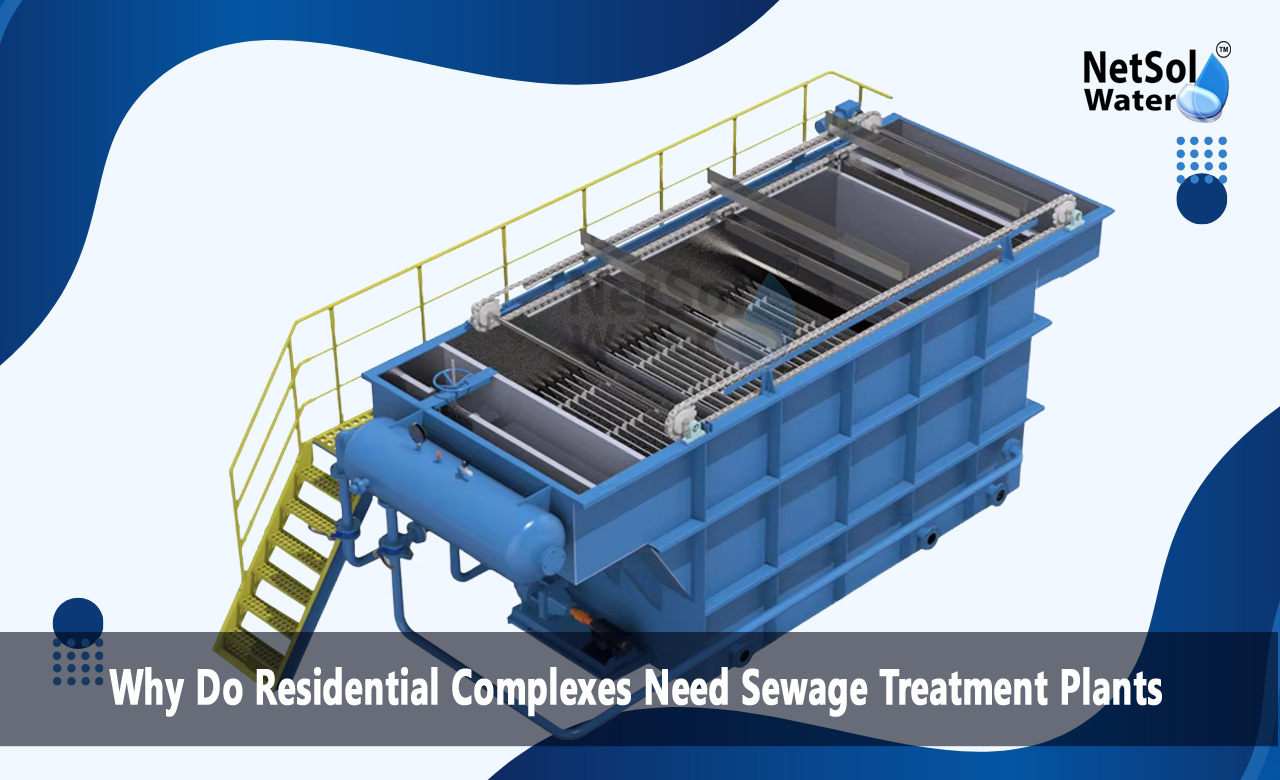Why Do Residential Complexes Need Sewage Treatment Plants?
Residential complexes need sewage treatment plants to manage wastewater in a safe and efficient way. Netsol Water leads the way as a sewage treatment plant manufacturer of solutions that match modern needs. Every day these plants work to clean used water and protect our surroundings. They stop pollutants from entering rivers and soil. They also help reuse water for gardening and cleaning. Netsol Water manufactures systems that adapt to the size and layout of any project. They offer reliable support from planning through installation. Their focus on quality and simple operation makes them a trusted partner for builders and property managers.
We will discuss why residential complexes need sewage treatment plants. We show how these systems benefit people and the planet.
1. Environmental Protection
Installing a sewage treatment plant helps preserve the natural world. Wastewater carries harmful substances that can harm rivers and soil. A treatment plant removes these dangers before the water flows back into the environment. Let us have a look at some key aspects of environmental protection.
Reduced Pollution
A sewage treatment plant separates solid waste from water and removes harmful chemicals. After treatment, the water meets strict quality standards. Rivers and lakes stay safe for fish and plants. Neighbours can enjoy clear water and green spaces.
Protected Ecosystems
When treated water returns to nature it supports healthy wildlife. Aquatic life can thrive in clean streams. Soil stays fertile and free of toxins. The local environment can recover and grow.
2. Regulatory Compliance
Governments set rules for wastewater management. These rules aim to protect public health and the environment. A treatment plant keeps residential complexes in line with all legal standards. Let us have a look at some important points under regulatory compliance.
Meeting Local Standards: Each region has specific limits for pollutants in wastewater. A well designed plant adapts to these limits. It ensures that every discharge stays within the required range.
Avoiding Penalties: Non compliance can lead to fines and legal action. A reliable system keeps data logs and shows proof of proper operation. Property managers can operate with peace of mind.
3. Water Reuse and Resource Recovery
Water scarcity affects many areas today. Treating wastewater lets residential complexes reuse water for non drinking tasks. This step reduces demand on local supply. Let us have a look at some features of water reuse and resource recovery.
Irrigation and Landscaping
Treated water can feed lawns and gardens. It arrives clean enough to keep plants healthy. Residents enjoy green lawns without tapping fresh water sources.
Toilet Flushing and Cleaning
A treated water line can supply toilets and wash areas. It cuts down on freshwater use. Buildings save on utility bills and conserve water.
4. Health and Hygiene
Proper wastewater handling protects residents from disease. Stagnant water and waste build up can breed bacteria and pests. A treatment plant controls these risks and keeps all areas safe. Let us have a look at some health and hygiene benefits.
Eliminating Pathogens: Treatment systems use natural processes and filters to kill germs. The final water meets hygiene norms. Residents can share common spaces without worry.
Odor Control: A sealed treatment unit contains smells and gases. It prevents foul air in basements and yards. Homes stay fresh and pleasant to live in.
5. Cost Efficiency
At first a treatment plant may seem like a major expense. In time it delivers savings on water bills and reduces legal fees. It also cuts costs linked to water delivery and waste removal. Let us have a look at some cost efficiency factors.
Lower Water Bills: By reusing treated water for non drinking uses the complex draws less from public supply. Bills shrink each month. Owners can reinvest savings in facility upgrades.
Reduced Disposal Costs: A local treatment plant cuts the need for frequent waste tanker visits. It handles most waste on site. Properties save on transport and disposal service fees.
6. Sustainability and Future Readiness
Long term planning calls for green solutions that last. A good treatment plant adapts to growth and new regulations. It helps complexes build a reputation for sustainability. Let us have a look at some key factors in future readiness.
Scalable Design: Modern treatment units can expand as new buildings come up. They plug into extra tanks and filters without major work. The system grows with the project.
Energy Efficiency: Advanced models use low power pumps and natural processes. They cut electricity use and run costs. They also fit well with solar power setups.
Conclusion
Residential complexes need sewage treatment plants to protect health safety and the environment. Netsol Water leads as a manufacturer that delivers systems built for today and ready for tomorrow. They help projects comply with laws, save water, cut costs and boost sustainability. If you want to learn more about why residential complexes need sewage treatment plants or to request a consultation please reach out to Netsol Water today. Our experts stand by to guide you at every step.
Contact Netsol Water at:
Phone: +91-9650608473, Email: enquiry@netsolwater.com



